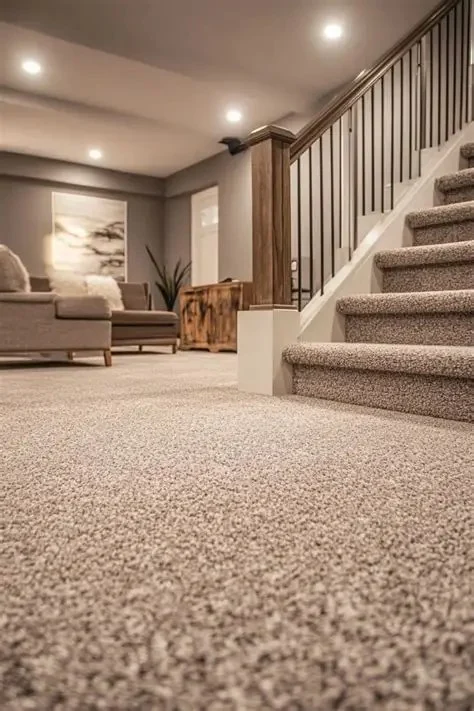
- 1. Why Choose Carpet for Your Basement?
- 2. Key Features to Look for in Durable Basement Carpets
- 3. Top Durable Carpet Options for Basements
- 4. Installation Tips for Basement Carpets
- 5. Real-Life Example: Transforming a Basement with Durable Carpets
1. Why Choose Carpet for Your Basement?
When transforming a basement into a functional and comfortable living space, selecting the right flooring is crucial. Many homeowners overlook carpeting due to concerns about moisture or durability. However, with the right carpet options, a basement can be both cozy and stylish. Carpet provides warmth, noise reduction, and a soft surface, making it ideal for creating a welcoming environment.
Basements are often used as extra living spaces, home theaters, or family rooms, making them high-traffic areas. Choosing a durable, moisture-resistant carpet is key to ensuring the longevity of your flooring while also keeping your basement comfortable throughout the year. Modern basement carpets are designed to withstand the challenges of this environment, offering both aesthetic appeal and functionality.
2. Key Features to Look for in Durable Basement Carpets
2.1 Moisture Resistance
One of the most important features to consider when choosing a basement carpet is moisture resistance. Basements are often prone to humidity and occasional flooding. Carpets made from synthetic fibers like nylon or polyester tend to resist moisture better than natural fibers like wool, which can absorb water. Additionally, moisture-resistant carpets help prevent the growth of mold and mildew, which is crucial for maintaining a healthy living space.

TLC Floor Center
NorwichSoutheastern Connecticut Planning RegionConnecticut
682 Boswell Ave, Norwich, CT 06360, USA
2.2 Durability
Basement carpets should be able to withstand heavy foot traffic, especially if the space is used for family gatherings, exercise, or entertainment. Look for carpets with a dense pile and high-quality backing, which will help prevent wear and tear. Carpets with stain-resistant treatments are also beneficial for areas prone to spills or accidents, helping to keep your basement looking pristine over time.
2.3 Insulation and Comfort
While basements can be cooler than the rest of the house, the right carpet can add insulation, making the space more comfortable. Thick, plush carpets trap heat and provide a warm surface for your feet, especially during colder months. Additionally, carpeting enhances the comfort of your basement, making it a more inviting space for family activities or entertainment.
2.4 Easy Maintenance
Maintenance is an essential consideration for basement carpets. Look for carpets that are easy to clean and maintain. Carpets with stain-resistant coatings or those made from synthetic fibers can be easier to vacuum and clean, requiring less effort to keep them in good condition. With the occasional basement moisture issues, carpets that can dry quickly and resist staining will ensure long-lasting beauty and functionality.
3. Top Durable Carpet Options for Basements
3.1 Nylon Carpets
Nylon is one of the most popular and durable carpet fibers available. It is resistant to abrasion, stains, and moisture, making it an excellent choice for basements. Nylon carpets are easy to clean, and they retain their shape and appearance even after years of use. With proper care, nylon carpets can last for many years, offering both durability and aesthetic appeal.
3.2 Polyester Carpets
Polyester carpets are known for their resistance to moisture and staining, which makes them ideal for basement environments. Polyester is also a more affordable option compared to nylon, while still providing durability and a soft texture underfoot. Additionally, polyester is available in a wide range of colors and styles, making it easy to find an option that complements your basement's design.
3.3 Wool Carpets with Moisture-Resistant Backing
Wool carpets are naturally luxurious and comfortable, but they may not be the best option for moisture-prone areas like basements. However, modern wool carpets often come with moisture-resistant backing, making them a viable option for basement spaces. If you're looking for a carpet that offers both warmth and a natural aesthetic, wool with moisture-resistant backing can be an excellent choice, as it combines comfort with practicality.
3.4 Modular Carpet Tiles
Modular carpet tiles are a fantastic option for basements due to their versatility and easy installation. These tiles come in a variety of materials, including nylon and polyester, and can be easily replaced if damaged. Modular carpet tiles are particularly helpful for basements, as they can be swapped out individually without needing to replace the entire carpet. This is especially useful if your basement is prone to water damage or wear in specific areas.
4. Installation Tips for Basement Carpets
4.1 Prepare the Subfloor
Before installing a basement carpet, it’s essential to ensure that the subfloor is dry, clean, and level. Moisture can be a major issue in basements, so it’s important to check for any signs of water damage or leaks. Using a moisture barrier underlayment can help protect your carpet from potential water issues, ensuring that it lasts longer and remains in good condition.
4.2 Use a Professional Installer
While installing carpet in a basement can be a DIY project for some, it's often best to hire a professional installer to ensure the job is done right. A professional will have the expertise to properly lay the carpet, install moisture barriers, and address any potential issues, such as uneven surfaces or moisture concerns. Professional installation also ensures a more polished finish and can help avoid any future problems with carpet durability.
4.3 Regular Maintenance
Once your carpet is installed, regular maintenance is key to keeping it in good condition. Vacuum your basement carpet regularly to remove dirt, debris, and dust. Spot clean any spills or stains immediately, and consider using a carpet cleaner designed for basement use to remove deep-set grime. Additionally, it’s essential to keep an eye on humidity levels in the basement to prevent moisture buildup that could damage your carpet.
5. Real-Life Example: Transforming a Basement with Durable Carpets
Consider the example of a family in Chicago who wanted to transform their basement into a cozy, functional family room. After considering various flooring options, they chose a durable polyester carpet that could withstand the basement’s high humidity levels. The carpet’s easy-to-clean surface and moisture resistance were key factors in their decision, ensuring the basement would remain comfortable and dry even during the humid summer months.
The result was a transformed space with a modern, inviting feel, perfect for family movie nights and gatherings. By choosing the right durable carpet, the family ensured their basement would stay comfortable and stylish for years to come. For anyone looking to revamp their basement, this example highlights the benefits of choosing the right flooring solution, one that combines durability with comfort.

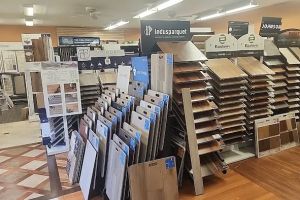
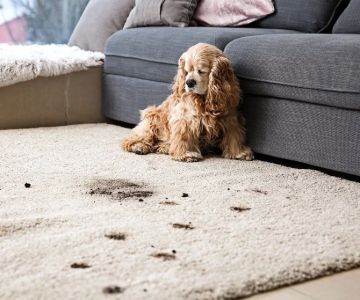

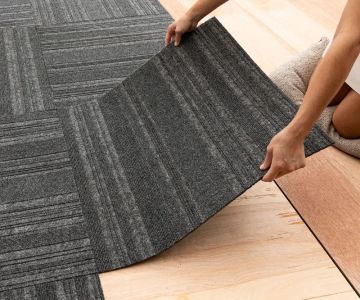
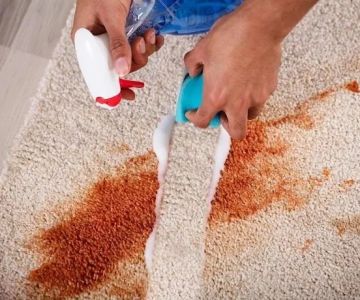
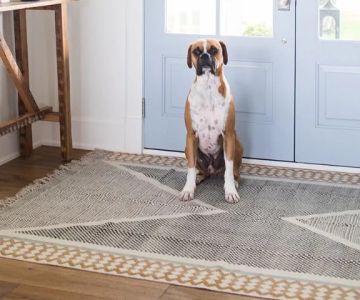
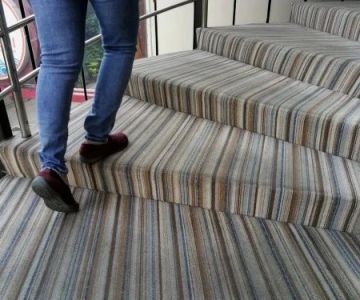
 Baystate Rug and Flooring3.0 (22 reviews)
Baystate Rug and Flooring3.0 (22 reviews) Manhattan Royal Carpet and Floors5.0 (11 reviews)
Manhattan Royal Carpet and Floors5.0 (11 reviews) King Floor Supplies 24.0 (35 reviews)
King Floor Supplies 24.0 (35 reviews) World Market4.0 (481 reviews)
World Market4.0 (481 reviews) The Home Depot4.0 (997 reviews)
The Home Depot4.0 (997 reviews) Kaoud Rugs4.0 (123 reviews)
Kaoud Rugs4.0 (123 reviews) Understanding Carpet Density and Why It Matters
Understanding Carpet Density and Why It Matters Understanding the Cost Differences Between Carpet Types
Understanding the Cost Differences Between Carpet Types Choosing the Best Carpet for Homes with Pets
Choosing the Best Carpet for Homes with Pets How to Prevent Carpet Damage from Pets and Kids
How to Prevent Carpet Damage from Pets and Kids What Are the Benefits of Carpet in a Home with Allergies? | CarpetHub
What Are the Benefits of Carpet in a Home with Allergies? | CarpetHub How to Choose the Right Carpet Padding for Maximum Comfort and Longevity
How to Choose the Right Carpet Padding for Maximum Comfort and Longevity